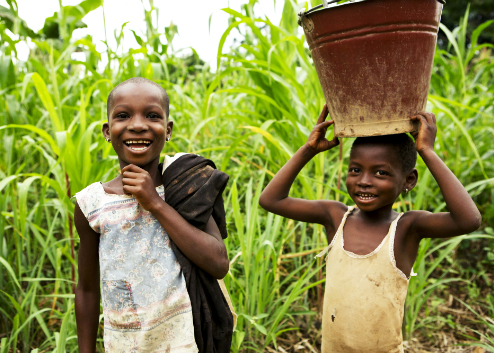Five Ways Global Communities Fight Poverty in Ghana

A non-profit organization called Global Communities works to end poverty in Ghana with a 5-point plan in conjunction with USAID’s Multi-Sectoral Nutrition Strategy.
The non-profit organization works in more than 20 countries around the world, with Ghana being a focus of the recent programs. Global Communities, created about 60 years ago, works with the private sector, governments and local communities to provide the “means and ability to live and prosper with dignity,” something it ensures under its organization’s vision.
The Maryland-based organization paired with USAID in support of the Multi-Sectoral Nutrition Strategy to be implemented over the years 2014-2025. The program’s goal seeks to reduce chronic malnutrition by 20 percent over those 11 years. Global Communities has put forth these five goals in hopes of accelerating the fight against malnutrition in Ghana.
1. Provide more opportunities for economic growth through microfinance
Individuals who do not have access to the capital provided by large financial services corporations can gain access to funds through various microfunding institutions. These smaller companies allow a more intimate relationship between the lender and the borrower. Global Communities works through Boafo Microfinance Services in order to provide low-income Ghanaians with the money for new businesses, education and homes.
2. Build a more “resilient” Ghana by improving the nutrition in local diets
In order to reach this goal, Global Communities has partnered with the USAID/Ghana Resiliency in Northern Ghana (RING) program to “reduce poverty and improve the nutritional status of vulnerable populations.” The introduction of the sweet potato in local Ghanaian farms was a successful implementation of the partnership. Both USAID and Global Communities hope to educate communities on the importance of good nutrition instead of just providing temporary relief.
3. Create pathways for urban youth to become financially independent
Global Communities has joined the Youth Inclusive Entrepreneurial Development Initiative For Employment in opening up the construction sector to Ghana’s youth. In five of the biggest cities in Ghana, the initiative hopes to “reach more than 23,000 youth” by teaching them the skills for employment. Because Africa’s youth makes up a majority of the population, targeting this demographic is the most effective way to reducing poverty in Ghana.
4. Improve access to clean water and sanitation
Working with both the public and private sector, Global Communities is working to enhance the current water and sanitation infrastructure. With focus on “slum communities” in three cities, the non-profit seeks to optimize every individual’s condition while constructing water and sanitation services that can be sustainable. These efforts are paired with USAID’s Water Access Sanitation and Hygiene for the Urban Poor (WASH-UP) and USAID’s WASH for Health (W4H). An important part of the relief is affecting a change in behavior which can help create a poverty-free society that operates without relief.
5. Upgrade local neighborhoods and reinforce political and social institutions
After the basic needs of food, water and shelter are met, a society can begin to upgrade its political, economic and social conditions. Global Communities, with the Bill & Melinda Gates SCALE-UP program, echoes this idea as it reinforces educational and financial institutions for residents in the low-income communities of Accra and Sekondi-Takoradi. The expansion of government services, such as female inclusivity and public transportation, in those regions is being implemented through the Our City, Our Say project.
Global Communities is just part of a larger non-profit coalition fighting against global poverty in Ghana. The process includes numerous programs with funding from various foreign governments, each generating results through their focus on different parts of the Ghanaian society. Readers can follow the various programs and outcomes on the Global Communities website.
– Jacob Hess
Sources: Global Communities 1, Global Communities 2, USAID 1, USAID 2
Photo: Borgen Project
